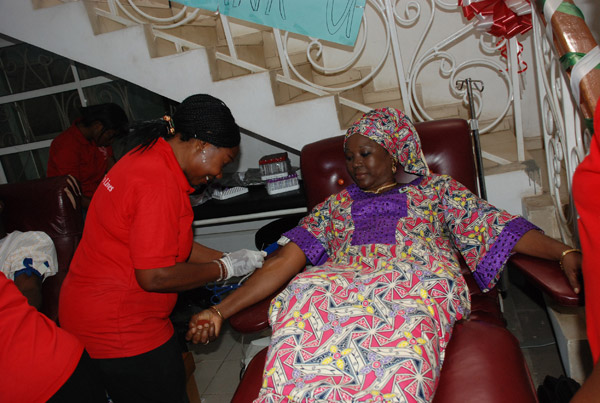So, we have done a bit of thinking into what it will take to run an efficient, proactive and responsive blood transfusion service in Nigeria. Firstly – lets look at how blood transfusion happens in Nigeria – Almost all of it is based on family or replacement and paid donations. For instance – when a woman is about to give birth, or a patient is about to go for surgery – they are asked to provide a number of units of blood. This is either donated by a family member or if unavailable, by a paid “donor”. This method increases the risk of infections including HIV (even when tested), Hepatitis B, Hepatitis C etc.
 |
| Culled from the National Blood Transfusion Service Website |
So basically there is an entire industry of illegal and lucrative blood banks that rely on “blood touts” for the supply of blood sold to needy patients. It is an incredible hassle getting blood, the chances are it might cause more harm than good. In recognition of this problem the National Blood Transfusion Services was set up and a National Blood Transfusion Policy adopted. But with its 15 centres across the entire country, there is very little it can do – and just like all our public sector services – it barely functions. To find out how a national blood service can work – I recently visited the South African National Blood Service headquarters in Johannesburg.
My first surprise was entirely organisational. While it is called the South African National Blood Service (SANBS) – it is actually not part of government and run as an autonomous not-for-profit organisation. It receives absolutely no allocated funds from government. However – the Department of Health of the Government of South Africa is its biggest client, taking up 55% of its services. Government hospitals buys blood from SANBS for its patients. SANBS ensures that all the required blood is delivered safely and, on time, and to to There is a negotiated price for a pint of blood, SANBS only gets paid when the blood required is delivered and runs its services completely based on fee-for-service income, in addition to some donations.
My second surprise – all its operations – all its 900,000 pints of blood required annually across the entire country are sourced entirely through voluntary blood donations. In addition to a strong regular donor base, it has an extremely active “marketing” team – using telerecruiting, university campaigns and increasingly social media tools such as twitter, Facebook to recruit donors. This is supported by a significant electronic database of all previous donors, enabling active management, follow up etc.
My third surprise – the risk of transmitting HIV through blood transmission in South Africa has been eliminated. This is because South Africa introduced NAT testing (a testing method that detects HIV almost immediately after infection). Since the introduction of NAT testing there has not been a single documented transfusion associated transmission of HIV. In Nigeria, blood is screened for HIV using only antibody tests. This does not detect HIV during the “window period” meaning that some blood units will continue to pass through screening undetected.
But, by far my biggest surprise was the steely determination of staff working at the blood unit to keep the blood supplies flowing. With this ticker on their website indication stock levels across the service they not only motivate themselves, but also alert the country to the needs of patients. Apart from the competence and determination of the staff – what else made this system work I asked ?. Three things – I was told.
1. three well equipped and managed laboratories
2. an integrated IT system
3. a tightly managed transport and logistics operations.
On driving away from SANBS …the penny drops. With a subvention driven blood service, managed by our Ministry of Health, it will never be able to meet the needs of the Nigerian people. The South Africans have managed to innovatively integrate incentives to drive a successful model – if they do not source the donors in order to supply the hospitals – they do not get paid! There are no such incentives for my colleagues at the Nigerian Blood Transfusion Service.
I hear many of you saying – but this is South Africa – Nigeria is way behind in terms of infrastructural and societal development. Well, that may well be the case, but it did not stop MTN from leap frogging its South African operations. Nigerian banks are right on the heels of the South Africans. So what is it that is driving exponential growth in these sectors that is absent in the health sector.
The answer is simple – a tax funded system of delivering services – almost entirely subsidised by government is unworkable in Nigeria. It is the same reason reason NITEL, NEPA, Nigerian Airways, our refineries etc all failed. Yes, we cannot completely privatise all our public services but we must innovate around them, seeking ways of introducing incentives to ensure delivery. This requires innovation – innovation is absent from the Nigerian public sector.
Consider that government organisations still carry files around manually from desk to desk as was the case in the 60s !!
Never doubt that a small group of thoughtful committed people can change the world; indeed it is the only thing that ever has…Margaret Mead



